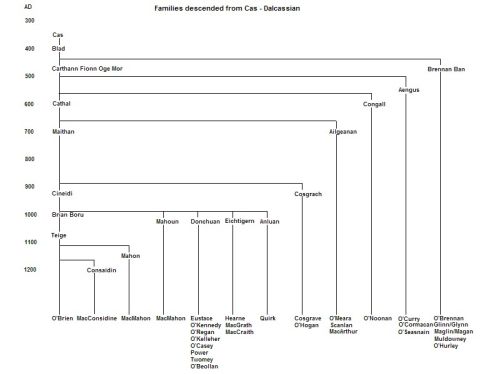Irish Type III Surnames
In looking at the Surnames of haplotypes that match the Irish Type III modal, we find that of those whose ancestry is known back to Europe, some 80% claim their ancestral line came from the Ireland, many stating the counties of Clare, Tipperary or Limerick.
These counties are the seats of many of the Dalcassian (Dal gCais) clans.
Dal gCais
The Irish Pedigrees state that the Dalcassions are the race of Cas, the sixth in descent from Cormac Cas, son of Oilioll Olum, King of Munster in the 3rd century. Through this line they are connected to Cashel and the other great families of the province of Munster. This great clan of Thomond (North Munster), holds several distinguished families including the chief family of the name, the O'Briens. The clan of the noted high king, Brian (Bóruma) Ború.
The published Irish pedigrees are, with recent DNA testing, proving to be incorrect. DNA is showing there was no common ancestor between all the Irish tribes that the genealogies say descend from Eoghan Mór (or Cas). I believe the tradition was conceived to create a sense of unity between the ruling tribes, and/or elevate tribes who were vying for supremacy. The latter seems to be the reason behind the O’Brien’s claim of descending from Cas – it was not until they were in power that this tradition began.
Pedigrees of many Dal gCais families can be found at:- Library Ireland

Click Here for a larger image.
From other sources, Dal gCais surnames are:-
- Ui Caisin - descendants of Caisin, son of Cas, the name of a branch of the Dal gCais of which MacNamara was chief.
- Muintear Ifearnain - The family of Ifearnan, a branch of the Dal gCais. This was the clan name of the O'Quinns of Thomand who descend from Ifearnan, (O Hiffernan) son of Corc, the 15th in descent from Cormac Cas, the ancestor of the Dal gCas or Dalcassions.
- Ui Bloid - descendants of Blod, son of Cas, a branch of the Dal gCais. This clan includes the O'Kennedy, O'Shanahan, O'Durack and O'Ahern families of eastern Co. Clare. The name is still preserved in the place name of the deanery of Omulled.
- Ui Cearnaigh - descendants of Cearnach, the branch of the Dal gCais of which the Ahernes were chiefs.
- Ui Ronghaile - descendants of Ronghal, a branch of the Dal gCais of which the O'Shanahans were chiefs.
- Ui Toirdealbhaigh - descendants of Toirdealbach (Father of St. Flannan), King of Thomond. The clan name of the O'Briens and their co-relatives in the east of Co. Clare.
- Also:- MacMahon of Thomond, McGrath, McCrath of Thomond, MacInerney, MacEnery of Thomond, McClancy of Clare, O'Grady of Clare and Limerick, O'Doughan of Cork, O'Dea of Clare, MagCoghlin of Offaly, and Conroy of Thomond.
It is understood that:-
- O'Brien are descendants from Brian Boru
- McGrath were poets to the O'Brien Clan and descend from Brian Boru's brother. (see Notes section)
- Hogan are descendants from Cosgrach, an uncle of Brian Boru
- Kennedy are descendants from a nephew of Brian Boru
- MacEnchroe - Crow(e) are a sub-sept of the O'Brien clan
- Casey are a sub-sept of the OBrien clan
- McMahon are a major sub-branch of O'Brien clan
- O'Mahony are descended from Mathghamhain (Irish for bear), the grandson of Brian Boru through his daughter Sabh who married Cian (O'Mahony). So this line is not Dalcassian in the male line.
- Ryder is the English form of O'Markahan, a Dalcassian surname from marcach = a rider.
When we look at the Type III haplotypes, many of these names appear, particularly the O'Briens. However, not all, in fact only a small percentage of each surname may be Irish Type III. The DNA of most Irish surnames is often found to be a mixture of E3b, I1a or another of the R1b clusters.
Not all surnames with the Type III signature have defined connections with Dal gCais septs; there have been many opportunities for non-paternal events over the ages. It is also simplistic to believe that all members of a clan hold the same surname because of a biological patrilineal connection. In-laws, friends, servants, and other associates may well have paired the name of their leader with their own Y chromosome. When I find further connections of a surname with a Dal gCais sept, I will update the notes section.
I have had a paper published in Journal of Genetic Genealogy www.jogg.info/51/index.html A set of Distinctive Marker Values Defines a Y-STR Signature for Gaelic Dalcassian Families which sets out my research.

